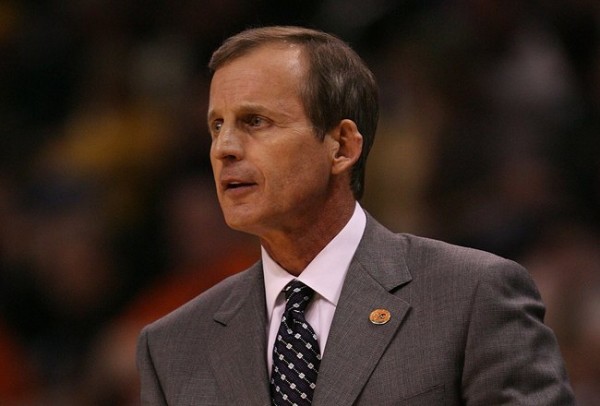“Fire Rick Barnes?” Not So Fast…
Posted by Chris Johnson on December 19th, 2013One of the things college basketball observers thought they knew to be true heading into the 2013-14 season was that Texas coach Rick Barnes’ tenure was nearing its end. He was doomed to be fired at (or possibly before) the end of the season, was the thinking. It wasn’t a matter of if, but when. Last season, the Longhorns missed the NCAA Tournament and lost more games than they had won for the first time under Barnes. It was the second consecutive year his team didn’t post a winning record in Big 12 play – after finishing above .500 against league competition the previous 13 years. Texas hasn’t advanced past the round of 32 in the Tournament since 2008, and Barnes’ recruiting prowess had seemingly eroded to unthinkable depths; of Scout. com’s 21 top-40 recruits from Texas in the past seven recruiting classes, only one (2012 center Cameron Ridley) had signed to play with the Longhorns, according to Gary Parrish. There was plenty of talk that Barnes – who in the past had brought in such top prospects as Avery Bradley, Daniel Gibson, Damion James, Cory Joseph, Kevin Durant, LaMarcus Aldridge, D.J. Augustin, Myck Kabongo and Tristan Thompson — had lost the drive and energy to recruit top prospects as persistently as he once did. Sources who spoke to Parrish said, “Barnes became disenchanted with the off-court grind it takes to maintain a certain level of success.”
Top-ranked 2014 point guard Emmanuel Mudiay’s commitment to SMU in August was seen less as a promising development for Mustangs hoops than an indictment of Barnes’ inability to recruit in-state talent. Not only did Mudiay, who is projected as the fifth overall pick in DraftExpress’ 2015 mock draft, spurn Texas – he didn’t even consider the Longhorns one of his final choices. Things looked even bleaker when former Texas Director of Athletics DeLoss Dodds, long an ardent supporter of Barnes, announced on October 1 he was stepping down. A week later, Sports Illustrated’s Pete Thamel released a comprehensive report on the state of Texas’ athletic department that included quotes from Dodds and an anonymous high-ranking athletic department official that seemed to add credence to the widespread speculation that Barnes’ job was in danger. “I worry more about basketball,” Dodds told Thamel. “If I were going to pick one [program] to worry more about, I worry more about basketball.” Said the official, “I can’t imagine [Barnes] turning it around.” Another reason why Barnes’ job security appeared so tenuous heading into the season? His top four-scorers from 2012-13 (Kabongo, Sheldon McClellan, Julien Lewis, and Ioannis Papapetrou) had, either by way of transfer or signing professional contracts, left the program. The writing was on the wall for Barnes. His long and mostly successful stint as Texas’ coach had run its course, it seemed. He had virtually no hope of turning things around.
You could have skipped over that long-winded introduction and still been impressed by what the Longhorns did in Chapel Hill on Wednesday night. Barnes’ team upset the no. 14 Tar Heels to move to 10-1 and establish itself as a legitimate candidate for an at-large NCAA Tournament berth this season. Prior to last night, Texas had built up an impressive record thanks to a slate of mostly easy games, but had lost the only difficult match-up (a neutral court date with BYU) it had played. So there was reason to question whether Texas could win a big game against an erratic but talented team like North Carolina. That the Longhorns did it – on the road, no less – is a testament to Barnes and his ability to coax cohesive, hard-nosed play out of a young group of players. The Longhorns grabbed a higher percentage of offensive (42.6% to 32.6%) and defensive rebounds (67.4% to 57.4%) than the Tar Heels, scored more points per possession (1.07 to 1.04) and blocked a higher percentage of shots (15.2% to 9.8%) in the game. It’s possible that this game was merely one of North Carolina’s bafflingly weird, early-season “WTF” performances – the same breed of dud it laid in losses to UAB and Belmont earlier this season. But that won’t matter when it comes time for the selection committee to vet Texas’ profile. The Longhorns aren’t a lock to qualify for the NCAATournament, even after this win, but it gives them a very nice chip to add to an already solid resumé. Texas has an RPI of #21, a top-50 win and just one top-50 loss – its only defeat of the season.
More importantly, there’s reason to believe Texas can keep playing well enough to notch a few more wins before March. The Longhorns are scoring more points per possession and giving up fewer than they did the last two seasons. They’re squandering fewer possessions to turnovers, blocking a higher percentage of shots and getting to the free throw line more often. Texas may not be able to compete with Oklahoma State, Baylor and Kansas at the top of the Big 12, but if it keeps playing this well and is able to pick up a few more notable wins during the conference season, it might be able to save Barnes’ job. The dire forecasts that loomed over Texas basketball and Barnes in the preseason might have been premature. Maybe he can lift the Longhorns back to the lofty place they inhabited throughout his first 10 years at the school. They were a Big 12 power, and given resources and location, what they should always be. Anything less is a failure on the coach’s behalf.













































